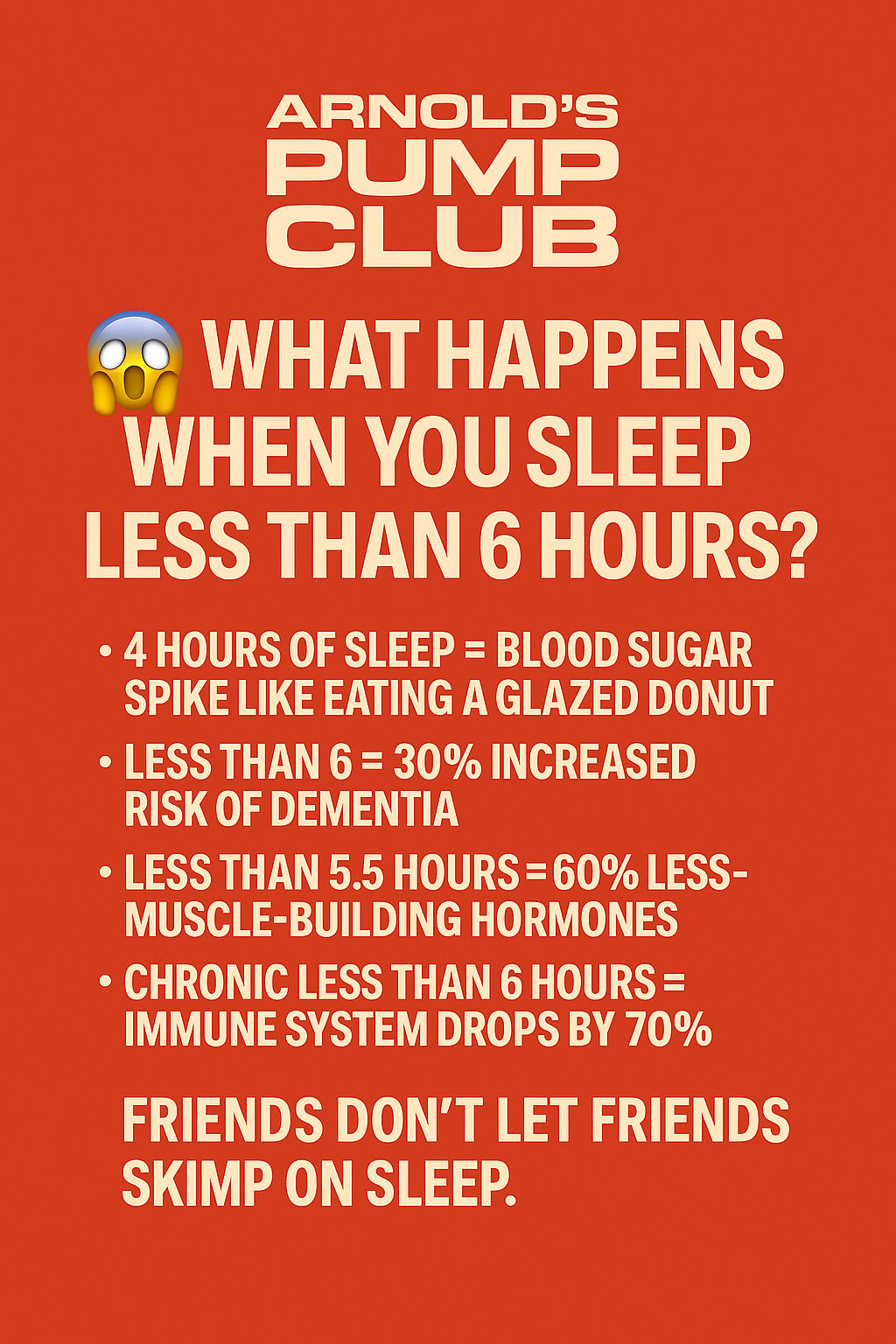Welcome to the positive corner of the internet. Every weekday, we make sense of the confusing world of wellness by analyzing the headlines, simplifying the latest research, and offering quick tips designed to make you healthier in less than 5 minutes. If you were forwarded this message, you can get the free daily email here.
Today’s Health Upgrade
A Parkinson’s breakthrough?
How sleep slows weight loss
Friends don’t let friends
Pregnancy and pumping iron
Arnold’s Podcast
Want more stories from Arnold? Every day, Arnold’s Pump Club Podcast opens with a story, perspective, and wisdom from Arnold that you won’t find in the newsletter. And, you’ll hear a recap of the day’s items. You can subscribe on Apple, Spotify, Google, or wherever you listen to podcasts.
On Our Radar
Hope for Parkinson’s?
What if the key to treating Parkinson’s isn’t just stopping the disease, but replacing what was lost?
A new study suggests that we might be getting closer to reversing the course of Parkinson’s disease.
In a groundbreaking Phase I clinical trial, researchers tested whether injecting human embryonic stem cell-derived dopaminergic neurons into the brains of people with Parkinson’s could safely replace the damaged neurons that no longer produce enough dopamine, a critical brain chemical involved in movement.
The trial was designed primarily to test safety. The results are extremely promising on that front: no serious side effects were reported, no signs of tumor growth were detected, and the transplanted cells survived.
However, researchers also observed signs of hope beyond safety. Participants who received higher doses showed mild-to-moderate improvements in motor function, and some even had visible reductions in tremors. Brain scans confirmed that the transplanted cells were active, producing dopamine in key brain areas. These early signs suggest the cells may be doing what researchers hoped: functioning like the dopamine-producing neurons lost in Parkinson’s.
The researchers believe the treatment works by replenishing the brain’s dopamine supply, improving signaling to the motor circuits affected by the disease. This cellular replacement strategy could potentially slow or reverse motor symptoms—something current therapies cannot do.
While it's still very early and more studies are needed to confirm long-term safety and efficacy, this test gives reason for hope.
If this research continues to show success, it could lead to the first treatment that replaces lost brain cells in Parkinson’s patients, offering not just symptom relief, but true restoration.
Together With Eight Sleep
How Sleep Slows Weight Loss
If you’ve been eating clean, exercising hard, and still can’t lose weight—or worse, you’re regaining what you lost—it might not be your willpower. It could be your pillow.
A research review confirmed that sleep deprivation disrupts your body’s hunger hormones, sabotaging both fat loss and long-term weight maintenance.
In a systematic review of clinical trials and randomized controlled studies, researchers examined how sleep affects weight management in healthy individuals actively trying to lose or maintain weight.
The scientists found that sleep—or the lack of it—was a significant factor influencing energy intake, fat loss, and metabolic health.
People who were sleep-deprived consumed an extra 200 to 500 calories per day. This is likely because sleep deprivation elevated ghrelin (which stimulates hunger) and reduced leptin (which signals fullness). This changes people’s eating behaviors by increasing their cravings for high-fat, high-carb foods.
Poor sleep also results in a “metabolic slowdown” by impairing insulin sensitivity, making fat storage more likely. As a result, when sleep is restricted during a weight-loss diet, fat loss drops by up to 55 percent compared to those getting adequate rest.
Sleep and weight loss are intimately related. Poor sleep makes it harder to lose weight and easier to regain it. And when you're chronically underslept, even a perfect diet and workout plan can backfire.
Sleep needs to be non-negotiable if you aim to lose weight or keep it off. Aim for at least 7 to 9 hours per night. Stick to a regular sleep schedule, reduce screen time an hour before bed, and limit caffeine in the afternoon.
If you need help improving your rest, even if you don’t have the perfect nighttime routine, new research suggests that chilling your body before and during sleep can help you fall asleep more quickly and enjoy higher-quality rest.
In the study, those who chilled their body by spending the night in a sleep pod experienced 34 percent more deep sleep and fell asleep 44 percent faster, increasing their deep and REM sleep, improving cardiovascular recovery, and reporting feeling calmer and more comfortable.
Sleep is at the heart of healthy living, whether it’s supporting weight loss or preventing health problems and diseases. If you want to upgrade your sleep, all APC readers receive $350 off the Eight Sleep pod.
Best of all? You can try it risk-free for 30 days. Unlike many supplements that aren’t backed by research or products with no guarantees, Eight Sleep allows you to see how the pod can instantly improve your rest.
We believe it’s one of the best investments you can make. Use the code “pumpclub” at checkout, and give it a try.
Friends Don’t Let Friends
Screenshot and share with a friend who needs to hear this

Health
Why Pregnant Women Should Pump Iron
Most people know that staying active during pregnancy is good for you. But what if the secret to a healthier, more energized pregnancy wasn’t walking or yoga, but strength training?
New research suggests that lifting weights during pregnancy can improve nearly every aspect of a woman’s health—from better sleep and stronger muscles to less pain and a better mood.
In a systematic review of randomized controlled trials involving more than 1,500 pregnant women, those who participated in strength-based programs experienced:
Less weight gain
Reduced low back and sciatic pain
Improved mood and psychological well-being
More physical activity, muscular strength, and flexibility
Better sleep and higher energy levels
While aerobic exercise is usually the focus of prenatal activity guidelines, strength training delivered benefits that extended beyond traditional cardio.
The researchers noted physical and emotional improvements, and moving with greater ease as the pregnancy progressed.
Even though the specific workouts varied across the studies, the outcomes were consistent: when pregnant women engaged in resistance training, they felt better and functioned better.
Always check with your healthcare provider before starting a new exercise program, but the research suggests added resistance can support a healthier pregnancy.
—
Publisher: Arnold Schwarzenegger
Editors-in-chief: Adam Bornstein and Daniel Ketchell
















































